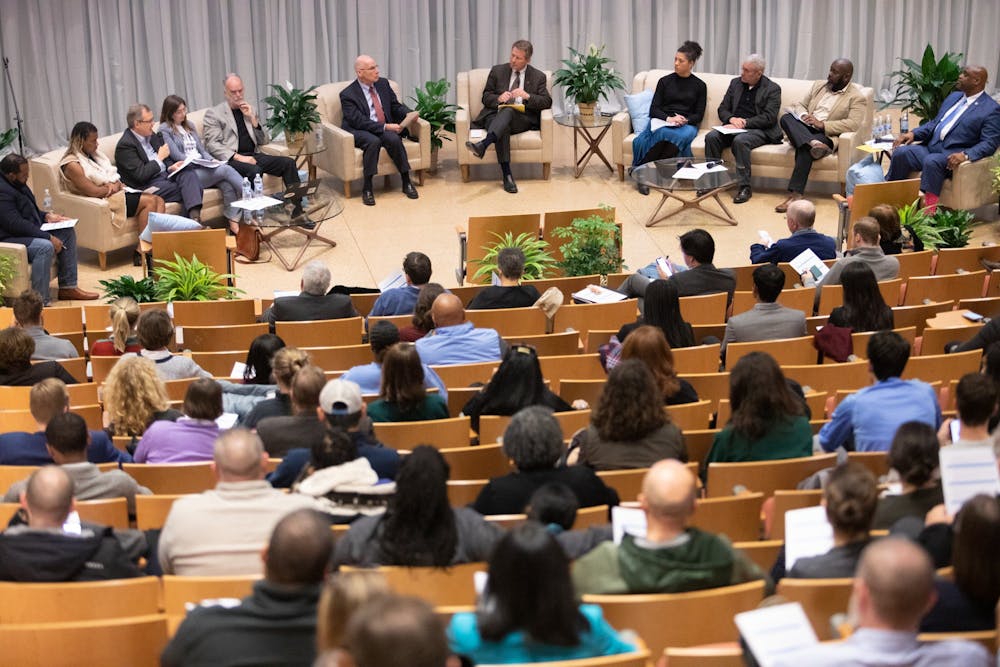“It would have investigatory powers when it receives complaints and when it feels necessary,” Herrington said.
Guskiewicz said he's explored the possibility of a safety and security advisory board, but a challenge arises when a committee has investigatory powers.
“But I do believe we could create something that I believe would add value to what the commission is already doing and serve much of the same purpose that’s been proposed here,” Guskiewicz said.
Maya Weinstein, a third-year student at the UNC School of Law, spoke on the topic of sexual violence. One of the committee’s recommendations was the creation of an interpersonal and sexual violence center backed by high-level institutional support.
“We have public health and other faculty who research these issues every single day,” Weinstein said. “Yet we don’t have a nexus to connect that to the experiences of students and faculty on our own campus, which is a waste of existing resources and the research and learning that we’re doing here.”
Weinstein expressed her frustration at the lack of change in recent years regarding the culture surrounding sexual violence on campus.
“The fact that we’re still sitting here asking for recommendations that are existing to be put into place and asking for more change is really frustrating, and makes it really hard to trust that an institution can make such culture change,” Weinstein said.
On the topic of communication, Eric Muller, professor in the School of Law, said the committee’s recommendation includes improving Alert Carolina and making University communications faster, more consistent and more transparent.
The committee also highlighted the need for clearer communication regarding the physical spaces in which weapons are allowed on campus, and better instruction on how to handle active shooter situations.
“I have to say that, you know, in the event that somebody were to come into the law school building or my classroom, god forbid, I wouldn’t have the faintest idea what to do,” Muller said.
De’lvyion Drew, a sophomore at UNC, gave recommendations regarding anti-racist activism. Drew said there is a necessity for increasing psychological services for students dealing with the mental health ramifications of involvement in activism.
“The psychological services for students on campus is something that certainly we need to pay close attention to, regardless of the cause of the challenges they’re facing,” Guskiewicz said in response. “The mental health task force is working closely to implement the programming around this.”
To get the day's news and headlines in your inbox each morning, sign up for our email newsletters.
Drew also recommended that the U.S. diversity general education requirement should be switched out with a race and reckoning requirement.
“If I took a class that’s on Brazil, and drums, and drum culture, that’s not teaching me about race, reckoning and racial equity in a way that I’m going to need in the workforce,” Drew said. “I think that having a race and reckoning project as a requirement instead of the U.S. diversity requirement is imperative to the success of all students.”
Quinton Smith, a second-year doctoral student in the School of Social Work, echoed Drew’s call for increased mental health services on campus and spoke more broadly about the need for spaces where members of marginalized communities can feel safe and accepted.
One of Smith’s recommendations included increased representation of individuals from marginalized communities on UNC staff, faculty and administrative leadership.
“Put simply, representation matters,” Smith said. “The reason I came back for a master’s degree and a PhD degree is because I saw people who look like me on the other side of the desk.”
At the end of the meeting, Drew said it is imperative that the University considers what it can do for the current student population and not just what it will do moving forward.
Baumgartner emphasized the need to change the culture and perceptions of campus safety at UNC.
"It can't be business as usual, and I think that's why we're here tonight," he said.
university@dailytarheel.com



